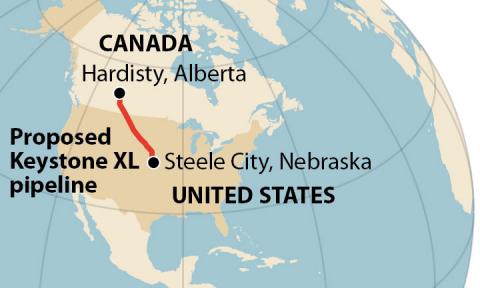Latest TC Energy oil spill confirms the wisdom of denying a permit for the Keystone XL pipeline

Key Findings
TC Energy’s efforts to portray itself as a responsible pipeline builder and manager are under new scrutiny, because its existing Keystone pipeline has become the source of a large oil spill in rural Kansas.
The length of the Keystone pipeline shutdown is uncertain, but it provides yet another example of the failure of the fossil fuel industry to live up to its claims of reliability.
The recent TC Energy oil spill is further evidence that the Biden administration’s decision not to issue a presidential permit for the Keystone XL pipeline was well-advised.
TC Energy has long complained that it should have been allowed to build a massive “Keystone XL” oil pipeline from Canada into the United States. When it failed to convince the Biden administration that the international pipeline was necessary, it reacted to the denied permit by filing a questionable international arbitration claim—still being reviewed—against the United States for $15 billion, an exorbitant amount of money. But TC Energy’s efforts to portray itself as a responsible pipeline builder and manager are under new scrutiny, because its existing Keystone pipeline has become the source of a large oil spill in rural Kansas.
Investigations are underway into the cause, but the impact is substantial. TC Energy reports that on Dec. 7, 2022, it “shut down the Keystone Pipeline System and mobilized people and equipment in response to a confirmed release of oil into a creek in Washington County, Kansas.” In its public statement, the company estimated the release volume at 14,000 barrels (approximately 588,000 gallons). This would, reportedly, be the largest crude oil leak on land since the Tesoro pipeline leak of more than 20,000 barrels in North Dakota in 2013.
TC Energy’s Keystone Pipeline originates in Hardisty, Alberta, Canada. It crosses the border into North Dakota and runs through South Dakota to Steele City, Nebraska, where it splits. One arm runs through Missouri into Illinois. The other runs south through Kansas and Oklahoma to Port Arthur and Houston, TX. The December oil spill site at Mill Creek, Kansas, lies roughly 20 miles (32 km) south of Steele City.
The U.S. Pipeline and Hazardous Materials Safety Administration (PHMSA) issued a corrective order on Dec. 8, requiring TC Energy to keep the affected segment of the pipeline (roughly 96 miles long) shut down until the agency authorizes it to be reopened. Under the order, TC Energy must conduct investigations and tests, produce a Root Cause Failure Analysis, carry out a Remedial Work Plan to fix the problem, and develop and propose a Restart Plan that must be approved by the PHMSA.
The cause of the spill is under investigation, but a couple issues are worth noting.
First, this is not an old pipeline. The spill occurred in the Cushing extension of the Keystone pipeline system, which runs from a Steele City pump station to a Hope pump station. The PHMSA reports the 36-inch diameter Cushing extension was completed in 2011. Pipelines often have lifespans measured in decades—why did this spill occur in a relatively new area of the pipeline?
Second, this incident comes nearly a year and a half after the Government Accountability Office issued an in-depth report on the pipeline’s repeated and worsening spill record and the various PHMSA orders requiring safety measures. Yet despite its history of high-profile failures, TC Energy clearly has failed to master oil spill prevention.
The length of the shutdown is uncertain, but it provides yet another example of the failure of the fossil fuel industry to live up to its claims of reliability.
IEEFA issued a report in June 2022 describing why shifts in Canadian oil sands production and U.S. pipeline development made Keystone XL an unreasonable energy investment. The IEEFA report noted, in particular, that the cancellation of Keystone XL was deemed credit-positive for its sponsor and that increasing competition from electric-powered vehicles is chipping away at the gasoline market, a primary end use for heavy oil. IEEFA also highlighted the findings of the U.S. Government Accountability Office (GAO) report on the history of TC Energy oil spills as a risk factor. This newest oil spill indicates that the risk factor is still a significant issue.
TC Energy’s objections to the denial of the Keystone XL pipeline notwithstanding, the Biden administration’s decision not to issue a presidential permit for the pipeline was well-advised. The latest oil spill on the existing Keystone pipeline is further evidence of the prudence of the decision.

















